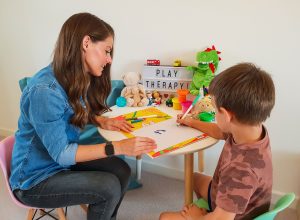Play Therapy
 Play therapy can help children make sense of difficult life experiences or situations, and explore feelings that may be having a detrimental effect on their emotional wellbeing and behaviour.
Play therapy can help children make sense of difficult life experiences or situations, and explore feelings that may be having a detrimental effect on their emotional wellbeing and behaviour.
Play is a developmentally appropriate means of communication and self-expression for many children, and so play therapy sessions offer a safe, consistent environment in which children can freely express themselves in their own way and at their own pace. The play therapist supports the child in their therapeutic process, developing a trusting relationship without judgement. Play therapy is to children, what counselling is to adults.
Play therapy happens on a weekly basis for a minimum of 12-14 weeks with a review every 6 sessions. Often children require further sessions, and this is regularly assessed based on their individual needs. It is important that sessions take place on the same day and time, in the same room in order to provide continuity for the child.
Children may benefit from play therapy if they…
• have experienced a loss or bereavement
• are suffering due to parental divorce or separation
• are suffering because of a breakdown within the family
• have suffered from neglect, emotional, physical, or sexual abuse
• live with long term health issues or conditions
• have experienced trauma individually or within the family
• experience friendship difficulties or bullying
• suffer with low self-esteem
• have disturbed sleep patterns or nightmares
• experience difficulties with eating or toileting
• appear anxious, stressed or obsessive
• appear withdrawn, sad or unhappy
• have frequent emotional or behavioural outbursts
• are not reaching their full potential, in or out of school
*Please note this is for guidance and referrals are not limited to this list.
If you have any questions as to the suitability of play therapy for your child or school and would like to know more, please do not hesitate to contact me. More information about Play Therapy can be found on the BAPT website.
